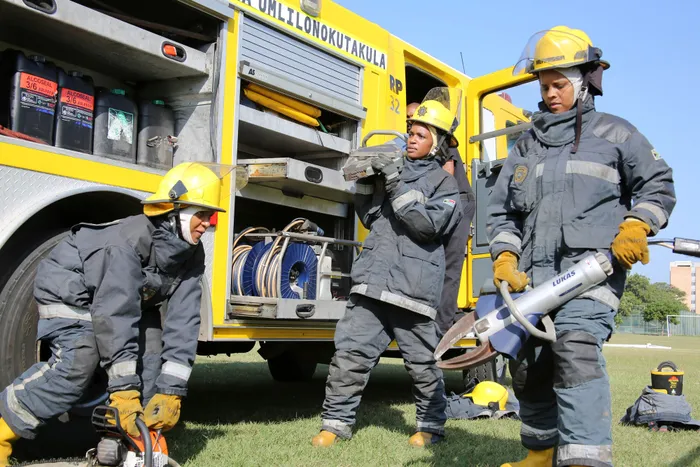People often think of firefighters as brave individuals who rush into danger when others flee. Their work is about much more than just putting out fires. These everyday heroes are essential to keeping people safe, responding to emergencies, and maintaining the health of communities. Firefighters do many important things, including fighting fires, rescuing people in distress, educating people about safety, and helping people after disasters. Because they are brave, disciplined, and well-trained, they are vital to society.
Firefighters’ Most Important Roles
Of course, firefighters are primarily about putting out fires. When a fire breaks out in a home, business, or remote area, firefighters are the first on the scene to put it out. To navigate dangerous, smoke-filled spaces, they use specialized tools like hoses, ladders, knives, and breathing apparatus. Their training allows them to quickly put out fires and handle situations, often risking their own lives to save others.
But today, firefighting is much more than this old image. In addition to fires, they are also called upon to respond to a variety of emergency situations, including car accidents, chemical spills, storms, and even medical care. Due to the extensive nature of their work, they must multitask and be mentally and physically prepared for any situation.
Search and Rescue and Emergency Services
Firefighters are often called upon to perform rescue missions as part of their job. This may involve entering a burning building and freeing trapped people or extricating people from a falling car. Firefighters are trained in difficult escape operations, such as rescuing people from water, heights, and confined spaces. You must be physically strong, well-trained, and able to remain calm under pressure to do this.
In many places, firefighters are also trained as paramedics or emergency medical technicians (EMTs). They often arrive at the scene of an accident or medical emergency before the ambulance crew can and perform first aid or CPR, saving lives. In such situations, their quick response and medical attention can mean the difference between life and death.
Prevention and Public Education
Firefighters play a critical role before disasters occur, not just during emergencies. They inspect buildings daily to ensure that safety measures such as fire alarms and sprinklers are working properly and that fire regulations are being followed. They must put out fires before they start, as it is always more effective and efficient to do so.
Another important part of a firefighter’s job is educating people about fire safety. They visit events, community centers, and schools to educate people about fire safety. For example, they teach people how to stop, fall, and roll, or how to create and practice an escape plan. This education not only reduces the risk of fire, but also ensures that children and adults are better prepared for emergencies.
Disaster Management and Response
Firefighters play a critical role in natural disasters such as storms, earthquakes, and floods. During these events, they help people get out of danger, search for and rescue people, and provide aid. They are extremely helpful in stressful and chaotic environments, as they know how to provide first aid, secure buildings, and coordinate emergency situations. In these types of tragedies, they often work long hours and risk their own families and homes to help others.
They do more than just provide aid; they also comfort and calm anxious people. Many people find it reassuring to know that firefighters are nearby, ready to help when needed.
Training and Physical Requirements
Becoming a firefighter requires rigorous mental and physical training. Fire academy teaches new firefighters everything from extinguishing fires and handling hazardous materials to helping others in emergencies and working as a team. Physical fitness is essential for this job, as you’ll be carrying heavy equipment, climbing ladders, hauling hoses, and working in hot, smoky environments.
Continuous learning is also important. To stay up to date on the latest tools and methods, firefighters undergo regular training and drills. To ensure quality and safety, they are constantly learning new things, such as how to drive an electric car to extinguish a fire and how to perform rescue work better.
Working together, like brothers
What makes firefighters unique is the close bond between team members. They may be responding to alarms late at night or working together to clean a building. A strong team spirit builds self-confidence, makes the job run more smoothly, and ensures that everyone is well taken care of.
The Power of Heart and Mind
Firefighting is not only physically demanding, but also emotionally taxing. As a firefighter, you witness terrible things like fires, car accidents, and even victims. After these things happen so often, stress, burnout, and even post-traumatic stress disorder (PTSD) can set in. That’s why many fire departments now offer psychotherapy, mental health services, and group support programs to help their teams cope with challenges.
Despite these challenges, many firefighters still find great satisfaction and pride in their work. The opportunity to save lives, their sense of responsibility, and their love for the community help them manage their emotions.
Summary: A Tribute to True Heroes
Firefighters do much more than just put out fires with hoses. They help those in need, teach others, and are valued members of society. The courage, self-discipline, and kindness of firefighters shine through in everyone they meet. In a world filled with fear and chaos, firefighters symbolize safety, hope, and kindness.
Showing appreciation for their work is more than just cheering on a parade. It means appreciating the important work they do every day, their sacrifices, and focusing on their health. Whether they’re running into a burning building or teaching kids about fire safety in a cool way, firefighters are true heroes.

